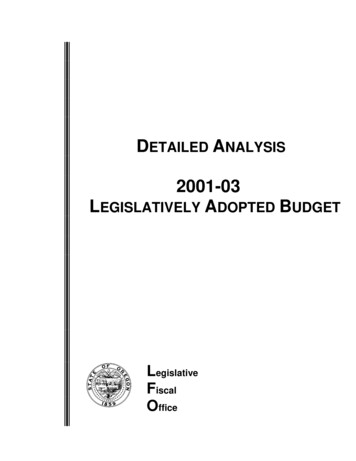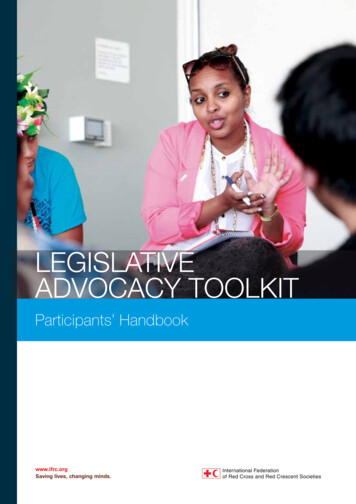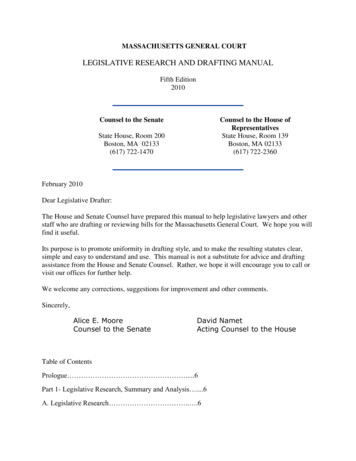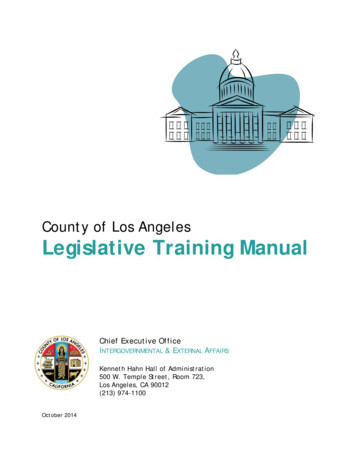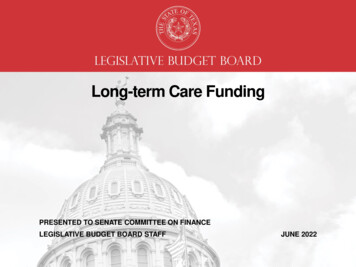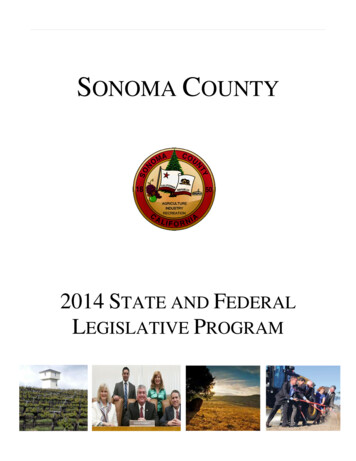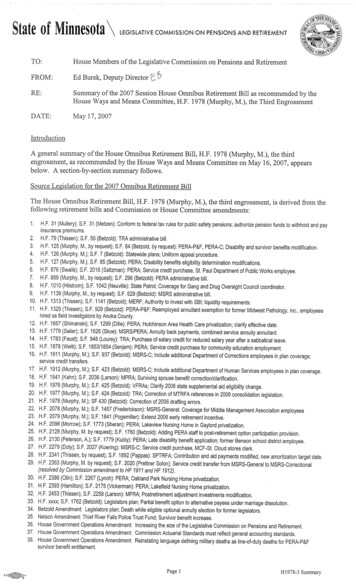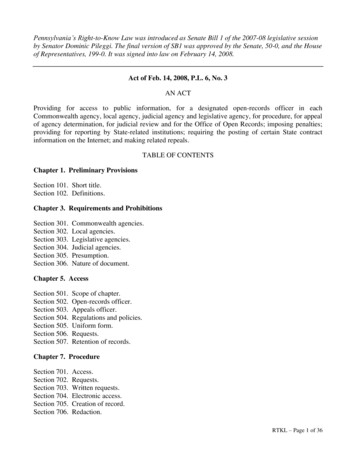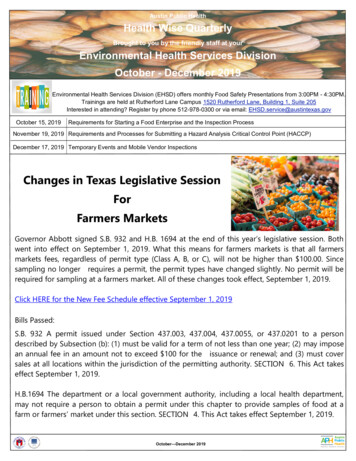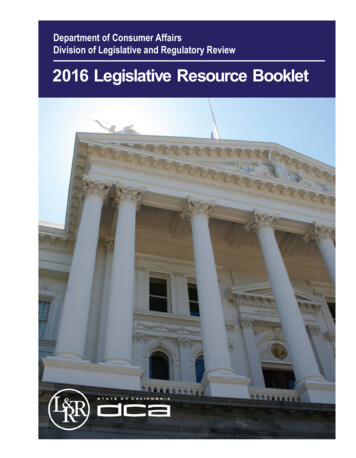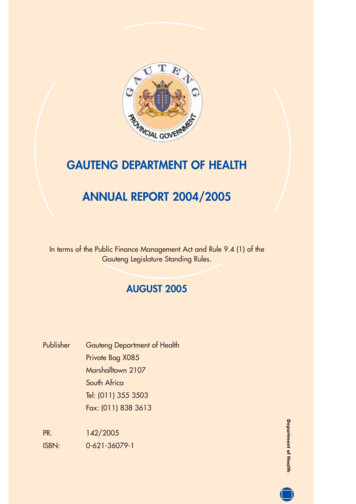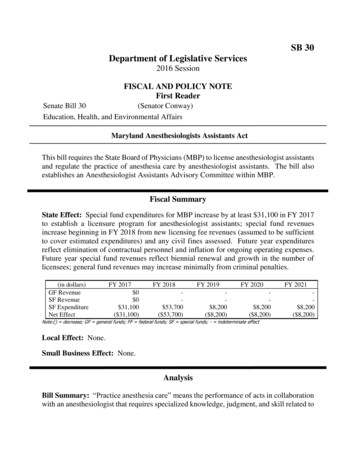
Transcription
SB 30Department of Legislative Services2016 SessionFISCAL AND POLICY NOTEFirst ReaderSenate Bill 30(Senator Conway)Education, Health, and Environmental AffairsMaryland Anesthesiologists Assistants ActThis bill requires the State Board of Physicians (MBP) to license anesthesiologist assistantsand regulate the practice of anesthesia care by anesthesiologist assistants. The bill alsoestablishes an Anesthesiologist Assistants Advisory Committee within MBP.Fiscal SummaryState Effect: Special fund expenditures for MBP increase by at least 31,100 in FY 2017to establish a licensure program for anesthesiologist assistants; special fund revenuesincrease beginning in FY 2018 from new licensing fee revenues (assumed to be sufficientto cover estimated expenditures) and any civil fines assessed. Future year expendituresreflect elimination of contractual personnel and inflation for ongoing operating expenses.Future year special fund revenues reflect biennial renewal and growth in the number oflicensees; general fund revenues may increase minimally from criminal penalties.(in dollars)GF RevenueSF RevenueSF ExpenditureNet EffectFY 2017 0 0 31,100( 31,100)FY 2018 53,700( 53,700)FY 2019 8,200( 8,200)FY 2020 8,200( 8,200)FY 2021 8,200( 8,200)Note:() decrease; GF general funds; FF federal funds; SF special funds; - indeterminate effectLocal Effect: None.Small Business Effect: None.AnalysisBill Summary: “Practice anesthesia care” means the performance of acts in collaborationwith an anesthesiologist that requires specialized knowledge, judgment, and skill related to
the administration of anesthesia. An “anesthesiologist assistant” means an individual whois licensed to perform delegated medical acts under the supervision of an anesthesiologist.Anesthesiologist Assistant LicenseAn individual must be licensed by MBP to practice anesthesia care as an anesthesiologistassistant in the State. This requirement does not apply to students enrolled in accreditedanesthesiologist assistant education programs who perform tasks under the directsupervision of an anesthesiologist, nor does it apply to federal employees practicing asanesthesiologist assistants within the scope of their employment.The bill specifies age, education, examination, and other requirements that an applicantmust meet to be licensed. An applicant must have graduated from an accreditedanesthesiologist assistant program and have passed a specified certification examination.An applicant must also have an active certification as a certified anesthesiologist assistantor other board-approved national certification.The bill authorizes MBP to issue temporary licenses – valid for 90 days – to specifiedapplicants pending examination results; it also specifies the process and requirements forplacing a licensee on inactive status and for license reinstatement and renewal. A licensemay not be renewed for a term longer than two years; MBP must establish continuingeducation requirements as a condition of license renewal.MBP must set reasonable fees for the issuance and renewal of licenses, review ofdelegation agreements, and other board services; the fees must be set so that fundsgenerated approximate the cost of maintaining the licensure program.Scope of PracticeAn anesthesiologist assistant may only practice under a delegation agreement, executed bya supervising anesthesiologist and the anesthesiologist assistant, which limits the scope ofpractice to specific medical acts outlined below. Delegation agreements must includespecified information, must be approved by MBP, and are valid for two years.A licensed anesthesiologist assistant may: assist in developing and implementing a patient’s anesthesia care plan;obtain informed consent from a patient or legal guardian for a planned anestheticintervention;take a patient history, perform relevant elements of a physical examination, andpresent a patient history to the supervising anesthesiologist;SB 30/ Page 2
pretest and calibrate anesthesia delivery systems and obtain and interpretinformation from the systems, in consultation with an anesthesiologist;assist with the implementation of medically accepted monitoring techniques;establish airway interventions, including intubation and ventilatory support;administer intermittent vasoactive drugs and start and adjust vasoactive infusions;administer anesthetic, adjuvant, and accessory drugs;assist in epidural, spinal, and other regional anesthetic procedures;administer blood, blood products, and supportive fluids;assist a cardiopulmonary resuscitation team in life-threatening situations;participate in authorized administrative, research, and clinical teaching activities;document information in a patient’s medical records; andperform other tasks for which the anesthesiologist assistant has been trained and arenot otherwise prohibited by law.A licensee may not (1) prescribe any medications or controlled substances; (2) administerdrugs, medicines, devices, or therapies that the supervising anesthesiologist is not qualifiedor authorized to prescribe; (3) practice or attempt to practice without the supervision of alicensed anesthesiologist or in a location where the supervising anesthesiologist is notimmediately available; or (4) perform any task that is not listed and approved in thedelegation agreement.An anesthesiologist assistant must clearly identify himself or herself to ensure that he orshe is not mistaken or misrepresented as a physician. In addition, patients in a facility withanesthesiologist assistants must be informed that an anesthesiologist assistant will beinvolved in their care.The supervising anesthesiologist is responsible for overseeing medical acts performed bythe anesthesiologist assistant and is liable for any of the assistant’s acts or omissions underthe anesthesiologist’s supervision and control. A supervising anesthesiologist may notdelegate medical acts under a delegation agreement to more than four anesthesiologistassistants at one time. An alternate supervising anesthesiologist, designated by thesupervising anesthesiologist, may provide direct supervision of an anesthesiologistassistant in accordance with the board-approved delegation agreement in the supervisinganesthesiologist’s absence.An anesthesiologist assistant who holds a temporary license may practice under adelegation agreement that is pending board approval if (1) the supervising anesthesiologistwho executed the pending agreement has been previously approved by MBP to superviseone or more anesthesiologist assistants in the practice setting for the same scope of practicein the pending agreement and (2) the anesthesiologist assistant has been previouslySB 30/ Page 3
approved for the same scope of practice in the pending delegation agreement in a differentpractice setting. If MBP modifies or denies the pending agreement, MBP must notify thesupervising anesthesiologist and anesthesiologist assistant of the cause for modification ordisapproval. Upon receipt of notice of a denial, the anesthesiologist assistant must stoppracticing immediately.Anesthesiologist Assistants Advisory CommitteeThe committee consists of seven members appointed by MBP: three licensedanesthesiologist assistants; one licensed physician who is a member of MBP; one licensedphysician who specializes in anesthesiology; one licensed physician who specializes inanesthesiology and is acting as a board-approved supervising anesthesiologist; andone consumer member. Committee members serve staggered three-year terms and maynot serve more than two consecutive terms. (For the initial committee, MBP mustsubstitute four licensed physicians who specialize in anesthesiology in place of thethree licensed anesthesiologist assistants and the board-approved supervisinganesthesiologist members. Initial memberships expire as specified in the bill.)The committee must make recommendations to MBP regarding the practice of anesthesiacare, continuing education requirements, and whether to approve applications for licensureand delegation agreements. Additionally, the committee must report any conduct of asupervising anesthesiologist or anesthesiologist assistant that warrants disciplinary actionand knowledge of any unauthorized practice. The committee must submit an annual reportto MBP, keep a record of its proceedings, and perform duties delegated to it by MBP. IfMBP rejects or modifies any committee recommendations, it must provide a writtenexplanation of its reasons.Disciplinary Grounds and ReportingThe bill sets specific grounds and procedures for disciplinary action against a licensee orapplicant. MBP, on the affirmative vote of a majority of a quorum of the board, may denya license, reprimand any licensee, place any licensee on probation, or suspend or revoke alicense, after providing an opportunity for a hearing.Within five days of the termination of an anesthesiologist assistant related to a quality ofcare issue, the supervising anesthesiologist and the anesthesiologist assistant must reportthe termination to MBP. The bill also requires hospitals, related institutions, alternativehealth care systems, and other employers to report to MBP if an anesthesiologist assistantis limited, reduced, otherwise changed, or terminated for reasons that might be grounds fordisciplinary action. The bill also describes circumstances under which a report is notrequired. MBP may impose a civil penalty of up to 1,000 for failure to report; any suchpenalty is deposited in the general fund.SB 30/ Page 4
If an anesthesiologist assistant attempts, offers, or performs a medical act beyond theindividual’s scope of practice and inconsistent with the delegation agreement, theindividual’s license must be revoked.A person who violates any provision of the bill is guilty of a misdemeanor and onconviction is subject to a fine of up to 5,000 and/or imprisonment for up to five years. Inaddition, a person who practices, attempts to practice, or offers to practice as ananesthesiologist assistant without a license is subject to a civil fine, assessed by MBP andpayable to the State Board of Physicians Fund, of up to 5,000.Program Evaluation and TerminationThe bill subjects the new licensure program to periodic review under the MarylandProgram Evaluation Act. A preliminary evaluation is required by December 15, 2023. Ifnot reauthorized, the program terminates on July 1, 2026.Current Law/Background:State Board of PhysiciansThe mission of MBP is to assure quality health care in Maryland through the efficientlicensure and effective discipline of health providers under its jurisdiction, by protectingand educating clients/customers and stakeholders and enforcing the Maryland MedicalPractice Act. The board has regulatory authority over physicians, physician assistants,radiographers, radiation therapists, nuclear medicine technologists, radiologist assistants,respiratory care practitioners, polysomnographic technologists, athletic trainers,perfusionists, and naturopathic doctors.Currently, the following seven advisory committees assist MBP in its oversight role: thePhysician Assistant Advisory Committee; the Radiation Therapy, Radiography, NuclearMedicine Technology, and Radiology Assistance Advisory Committee; the RespiratoryCare Professional Standards Committee; the Polysomnography Professional StandardsCommittee; the Athletic Trainer Advisory Committee; the Perfusion Advisory Committee;and the Naturopathic Medicine Advisory Committee.Nurse Anesthetists and Anesthesiologist AssistantsIn Maryland, anesthetics may be administered by a qualified physician, dentist, or nurseanesthetist. A physician assistant may also administer anesthesia if authorized to do so ina delegation agreement.SB 30/ Page 5
According to the American Association of Nurse Anesthetists, a certified registered nurseanesthetist works in collaboration with surgeons, anesthesiologists, dentists, podiatrists,and other health care professionals to administer anesthesia care in four categories:(1) preanesthetic preparation and evaluation; (2) anesthesia induction, maintenance, andemergence; (3) postanesthesia care; and (4) perianesthetic and clinical support. InMaryland, nurse anesthetists must be licensed and authorized to practice nurse anesthesiaby the State Board of Nursing.According to the American Academy of Anesthesiologist Assistants, an anesthesiologistassistant works under the direction of a licensed anesthesiologist to implement anesthesiacare plans. As of January 2015, 14 states, the District of Columbia, and Guam had licensureprograms for anesthesiologist assistants. Two states, Texas and Michigan, allowanesthesiologist assistants to practice under delegated authority but do not have specificlicensing schemes.The National Commission for Certification of Anesthesiologist Assistants (NCCAA)certifies anesthesiologist assistants. According to NCCAA, the certification processinvolves (1) initial certification through examination; (2) registration of continuing medicaleducation; and (3) successful completion of an examination for continued demonstrationof qualifications every six years. NCCAA advises that there are currently 14 certifiedanesthesiologist assistants in the Maryland area.Anesthesiologist assistant education programs are post-baccalaureate programs thattypically range from 24 to 27 months. The Commission on Accreditation of Allied HealthEducation Programs (CAAHEP) accredits anesthesiologist assistant programs in theUnited States. To date, CAAHEP has accredited 10 programs. The closest accreditedprogram is at Case Western Reserve University in Washington, DC; the class size is about20 students, about half of whom are from Maryland.According to CAAHEP, the responsibilities of anesthesiologist assistants and nurseanesthetists are identical; anesthesiologist assistants often work in organizations that alsoemploy nurse anesthetists. Anesthesiology assistants usually work in larger medicalfacilities that perform complex procedures such as cardiac surgery, neurosurgery,transplant surgery, and trauma care.State Expenditures: As the bill does not include a date by which anesthesiologistassistants must be licensed in order to practice in the State, it is assumed that licensure mustoccur as soon as possible after the bill’s effective date (October 1, 2016). However, it isunlikely that MBP can appoint an advisory committee and develop and approve regulationsin time to accept licensure applications in fiscal 2017. Therefore, this analysis assumesthat initial licensure begins in fiscal 2018.SB 30/ Page 6
MBP advises that it does not know how many individuals will apply for licensure underthe bill. However, given that there are currently 5 staff members handling theadministration of 11 allied health professions, MBP advises that existing staff cannotabsorb another program. MBP advises that a permanent, part-time (50%) administrativeofficer is needed to handle licensure and staff the advisory committee, and that apermanent, part-time (50%) database specialist is needed to make necessary modificationsto MBP’s licensing system.According to NCCAA, there are currently 14 certified anesthesiologist assistants in theMaryland area. This analysis assumes that each of these 14 anesthesiologist assistants willseek initial licensure in fiscal 2018 and a smaller number will seek initial licensure in eachfiscal year thereafter, with licensees renewing on a biennial basis. Thus, the Departmentof Legislative Services (DLS) advises that, due to the small number of anticipatedlicensees, the added responsibilities imposed by the bill can likely be performed bycontractual employees hired only to establish and initially implement the licensingprogram. Once the program is operational, existing MBP staff can likely absorb renewals,approval of delegation agreements, and the anticipated small number of ongoing newlicense applications. If more applicants seek licensure than anticipated, MBP may need tohire staff on a permanent basis.Based on these assumptions, special fund expenditures for MBP increase by at least 31,067 in fiscal 2017, which accounts for the bill’s October 1, 2016 effective date. Thisestimate reflects the cost of hiring one part-time (50%) contractual administrative officerto help develop regulations and recruit members for and staff the advisory committee, aswell as per diem and mileage reimbursement for seven advisory committee members. (Theboard advises that, as for board members, it pays all advisory committee members a perdiem and mileage reimbursement.) It includes a salary, fringe benefits, one-time start-upcosts, and ongoing operating expenses. Per diem and mileage reimbursement are estimatedat 1,288 per meeting, with meetings occurring on a monthly basis from November throughJune 2017, and every other month thereafter.Contractual PositionSalary and Fringe BenefitsPer Diems and Mileage ReimbursementOne-time Start-up CostsOngoing Operating ExpensesTotal FY 2017 State Expenditures0.5 15,94810,3044,363452 31,067MBP expenditures increase in fiscal 2018 to hire one part-time (25%) contractual databasespecialist to make appropriate one-time modifications to MBP’s licensing system; once thesystem has been modified for initial licensure in fiscal 2018, this position is no longernecessary.SB 30/ Page 7
This estimate does not include any health insurance costs that could be incurred forspecified contractual employees under the State’s implementation of the federal PatientProtection and Affordable Care Act.Future year expenditures reflect elimination of both contractual positions at the end offiscal 2018, as well as annual increases in ongoing operating expenses, including supplies,and per diems and mileage for advisory committee members.State Revenues: As MBP is special funded, it must set reasonable fees for the issuanceand renewal of licenses and other services it provides to anesthesiologist assistants.Licensure fees must be set so as to approximate the cost of maintaining the licensureprogram. This analysis assumes that MBP will set fees to ensure sufficient special fundrevenues to approximately cover the cost of the licensure program. In fiscal 2018, it isassumed that the biennial license fee will be set to cover the cost of the licensure programfor fiscal 2017 and 2018, as staff will be brought on to establish the licensure program infiscal 2017.Assuming 14 initial applicants for licensure, and based on the estimated expenditures statedabove, initial biennial license fees may be as much as 6,051 in fiscal 2018. It is unclearhow many new applicants may seek licensure per year. For illustrative purposes only, if10 new applicants seek licensure annually, biennial license fees could decline toapproximately 683 in fiscal 2019 and 2020.Nevertheless, DLS notes that revenues may not be sufficient to cover projected costs andthe board may need to cross subsidize. Actual license fees and revenues will depend onthe number of anesthesiologist assistants that seek licensure under the bill, as well as theactual costs incurred by MBP. For example, individuals from Washington, DC, may seeklicensure in Maryland under the bill; depending on the volume of applications received,MBP may incur increased costs, and fees will need to be adjusted accordingly.Additional Comments: The bill specifies that the new advisory committee and licensureprogram are subject to program evaluation and must undergo preliminary evaluation in2023 – three years before termination. However, MBP and all other advisory committeesunder its purview are subject to direct full evaluation, with a full evaluation beingconducted in 2016.SB 30/ Page 8
Additional InformationPrior Introductions: SB 798 of 2009, a similar bill, received a hearing in the SenateEducation, Health, and Environmental Affairs Committee and was referred to interimstudy. Its cross file, HB 1161, was withdrawn without a hearing in the House Health andGovernment Operations Committee.Cross File: None.Information Source(s): American Association of Nurse Anesthetists, AmericanAcademy of Anesthesiologist Assistants, Case Western Reserve University (Washington,DC), Commission on Accreditation of Allied Health Education Programs, NationalCommission for Certification of Anesthesiologist Assistants, Department of Health andMental Hygiene, Department of Legislative ServicesFiscal Note History:md/jcFirst Reader - January 26, 2016Analysis by: Sasika SubramaniamSB 30/ Page 9Direct Inquiries to:(410) 946-5510(301) 970-5510
generated approximate the cost of maintaining the licensure program. Scope of Practice An anesthesiologist assistant may only practice under a delegation agreement, executed by . anesthesiologist assistant without a license is subject to a civil fine, assessed by MBP and payable to the State Board of Physicians Fund, of up to 5,000. .
